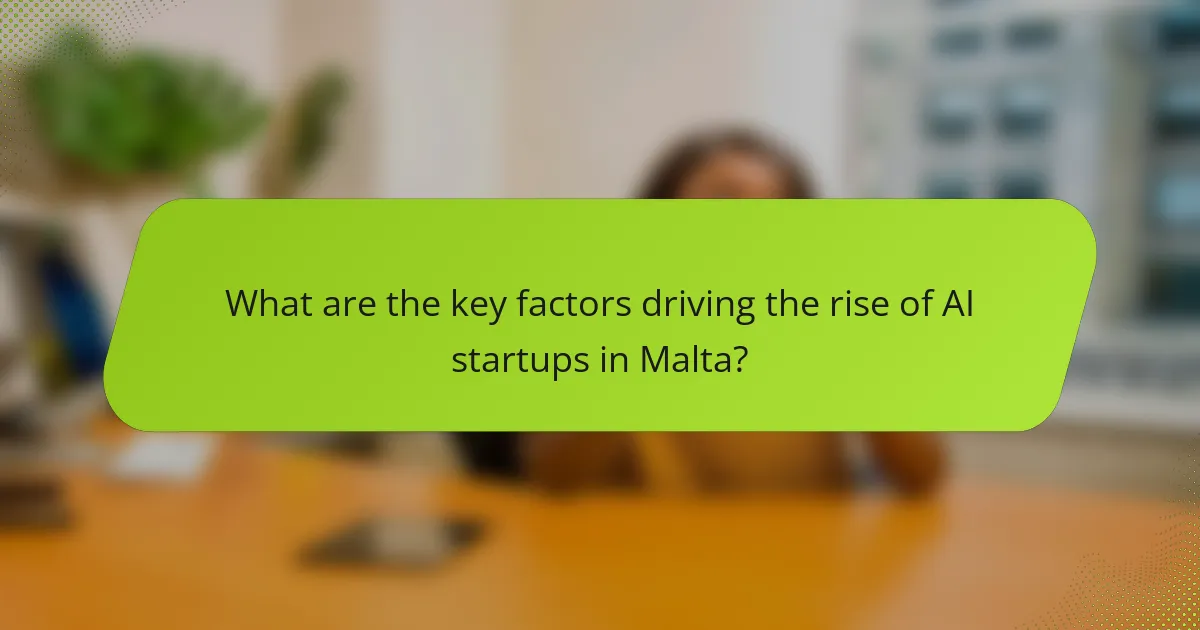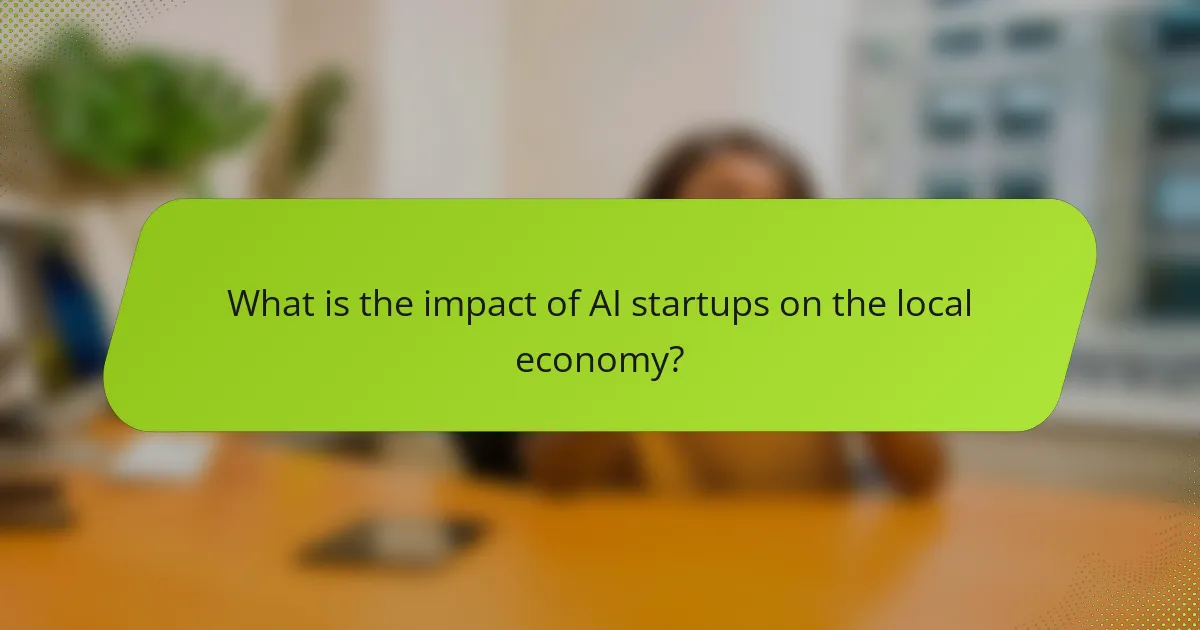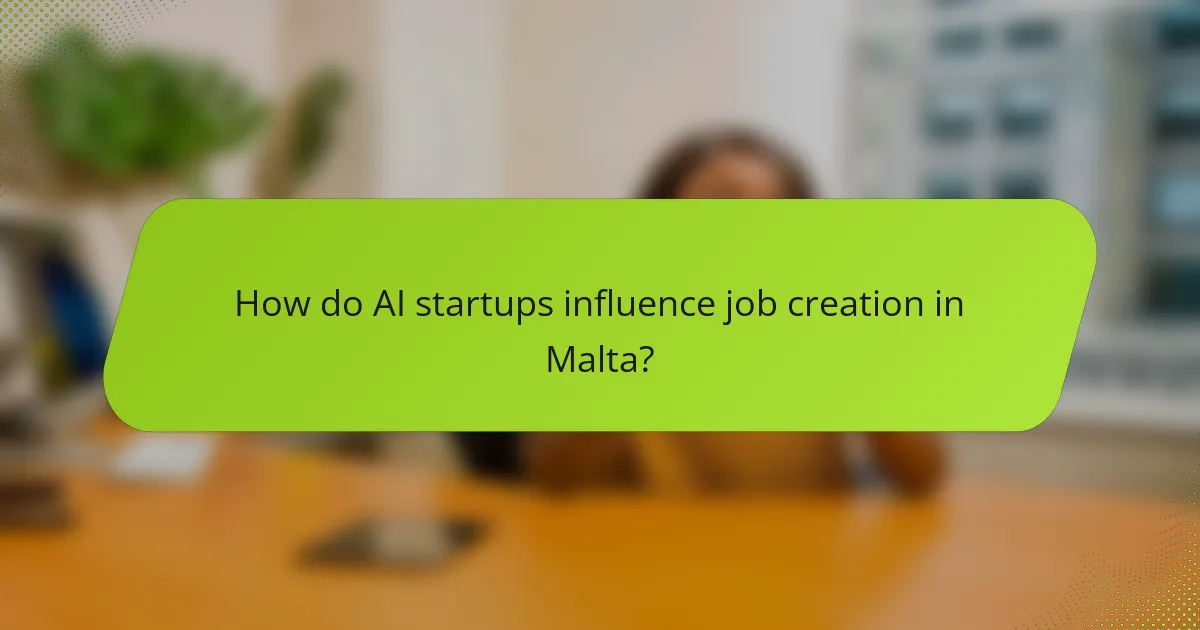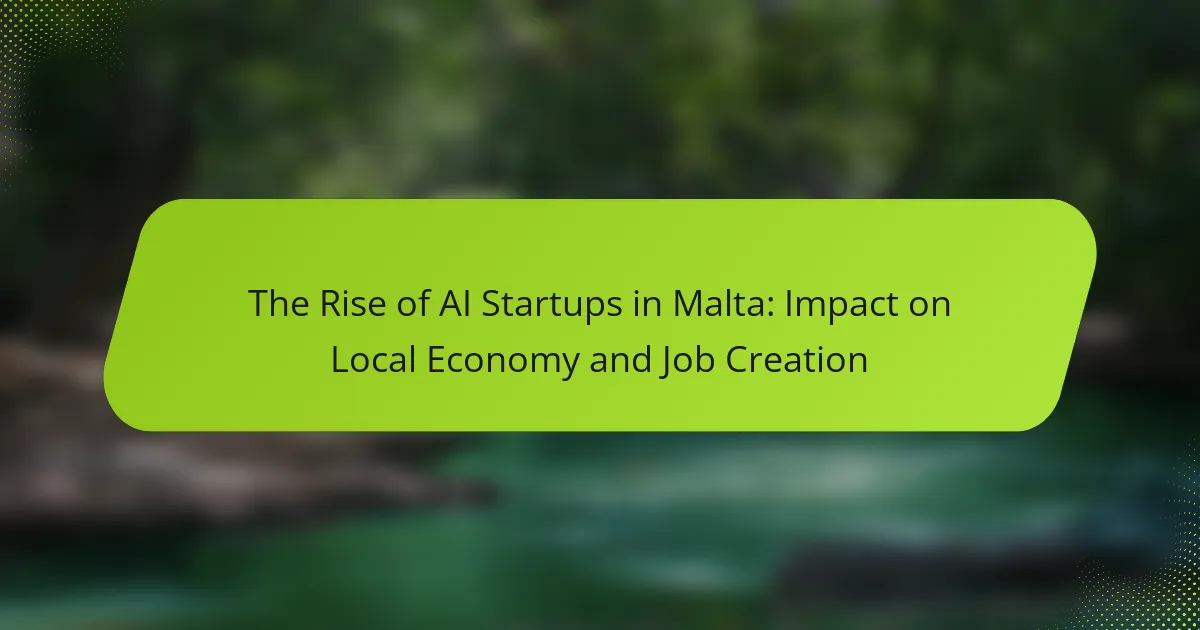
What are the key factors driving the rise of AI startups in Malta?
The key factors driving the rise of AI startups in Malta include government support, a skilled workforce, and favorable regulatory frameworks. The Maltese government has implemented initiatives to promote innovation and technology. These initiatives include funding programs and tax incentives for tech companies. Malta boasts a growing pool of talent from local universities and international professionals. This skilled workforce is essential for the development of AI technologies. Additionally, Malta’s regulatory environment is designed to attract tech startups. The country has established a legal framework for blockchain and AI, fostering growth. These factors collectively create a conducive environment for AI startups to thrive in Malta.
How has Malta positioned itself as a hub for AI innovation?
Malta has positioned itself as a hub for AI innovation through strategic government initiatives and regulatory frameworks. The Maltese government launched a national strategy for AI in 2020. This strategy aims to foster research, development, and deployment of AI technologies. Malta has also established a regulatory framework that promotes ethical AI practices. The country offers favorable tax incentives for tech startups, attracting foreign investment. Additionally, Malta hosts various AI-focused conferences and events, promoting collaboration. The presence of educational institutions offering AI programs further supports talent development. These factors collectively enhance Malta’s reputation as an AI innovation center.
What government initiatives support AI entrepreneurship in Malta?
The Maltese government supports AI entrepreneurship through various initiatives. The Malta Digital Innovation Authority promotes the development of AI technologies. The government offers funding programs for startups focusing on AI. Additionally, initiatives like the Malta Enterprise provide resources and assistance to AI businesses. The government also collaborates with educational institutions to enhance AI skills among the workforce. These efforts create a conducive environment for AI startups in Malta.
How does Malta’s regulatory environment foster AI startup growth?
Malta’s regulatory environment fosters AI startup growth by providing a supportive legal framework and incentives. The government has established a clear regulatory framework for AI, ensuring compliance and safety. This framework includes guidelines that promote innovation while protecting users. Additionally, Malta offers tax incentives to attract technology companies. These incentives lower operational costs for startups. Furthermore, the Malta Digital Innovation Authority supports emerging tech sectors, including AI. This authority helps startups navigate regulations and access funding opportunities. The combination of these factors creates a conducive environment for AI startups to thrive.
What role do educational institutions play in supporting AI startups?
Educational institutions play a crucial role in supporting AI startups. They provide access to research, resources, and talent. Universities often have dedicated programs for entrepreneurship and innovation. These programs foster collaboration between students and startups. Educational institutions also facilitate networking opportunities. Events and workshops connect startups with industry experts. Additionally, many institutions offer incubators and accelerators for startups. These initiatives provide mentorship and funding opportunities. Such support enhances the growth and sustainability of AI startups.
What programs are offered by universities to promote AI skills?
Universities offer various programs to promote AI skills. These include undergraduate and graduate degrees in artificial intelligence, machine learning, and data science. Many institutions provide specialized certifications in AI technologies. Workshops and boot camps focused on practical AI applications are also common. Online courses through platforms affiliated with universities enhance accessibility. Industry partnerships facilitate real-world AI projects for students. Research initiatives often involve student participation in AI advancements. These programs aim to equip students with essential skills for the growing AI job market.
How do partnerships between academia and industry enhance AI development?
Partnerships between academia and industry enhance AI development by facilitating knowledge transfer and resource sharing. Academia provides foundational research and theoretical frameworks. Industry offers practical applications and funding opportunities. Collaborations enable access to cutting-edge technology and data. For instance, joint research projects can lead to innovative AI solutions. These partnerships can also accelerate the commercialization of AI technologies. A study by the National Academy of Sciences highlights that such collaborations increase the efficiency of translating research into market-ready products. This synergy ultimately drives economic growth and job creation in the AI sector.

What is the impact of AI startups on the local economy?
AI startups significantly enhance the local economy by creating jobs and fostering innovation. They stimulate economic growth through investment in technology and infrastructure. AI startups often attract talent and skilled professionals to the area. This influx of talent can lead to higher wages and increased consumer spending. According to a report by the European Commission, AI technologies could contribute up to €13 trillion to the global economy by 2030. Local economies benefit from this growth through increased business opportunities and tax revenues. Additionally, AI startups often collaborate with local universities, enhancing research and development. This collaboration can lead to new educational programs, further strengthening the local workforce.
How do AI startups contribute to economic diversification in Malta?
AI startups contribute to economic diversification in Malta by fostering innovation and creating new job opportunities. They introduce advanced technologies that enhance productivity across various sectors. This diversification reduces reliance on traditional industries, such as tourism and finance. According to a report by the Malta Chamber of Commerce, AI startups have increased the number of tech-related jobs by 15% in the past three years. Additionally, these startups attract foreign investment, boosting the local economy. They also promote collaboration between academia and industry, leading to a skilled workforce. This synergy supports Malta’s transition to a knowledge-based economy.
What sectors are most positively affected by AI innovations?
The sectors most positively affected by AI innovations include healthcare, finance, and manufacturing. In healthcare, AI enhances diagnostics and personalized treatment plans. A study by Accenture found that AI could save the U.S. healthcare system $150 billion annually by 2026. The finance sector benefits from AI through improved fraud detection and risk assessment. According to McKinsey, AI can increase productivity in financial services by 22% by 2030. Manufacturing sees efficiency gains through predictive maintenance and automation. Research from PwC indicates that AI could contribute up to $15.7 trillion to the global economy by 2030, significantly impacting manufacturing productivity.
How does the presence of AI startups influence local investments?
The presence of AI startups significantly boosts local investments. These startups attract venture capital due to their innovative potential. Investors are drawn to the high growth prospects associated with AI technologies. For example, in 2021, global investments in AI startups reached over $66 billion. This influx of capital often leads to the development of supporting infrastructure. Local businesses may also benefit from partnerships and collaborations with AI companies. Furthermore, the presence of AI startups can stimulate job creation, enhancing the local economy. Overall, AI startups serve as a catalyst for increased investment activity in their regions.
What are the potential economic challenges posed by the rise of AI startups?
The potential economic challenges posed by the rise of AI startups include job displacement and increased market competition. Job displacement occurs as AI technologies automate tasks traditionally performed by humans. This shift can lead to unemployment in certain sectors, especially in low-skill jobs. Increased market competition may result in established companies struggling to adapt. They face pressure to innovate or reduce costs in response to agile AI startups. Additionally, there are concerns about market monopolization. If a few AI startups dominate, they could limit opportunities for others. This can stifle innovation and reduce overall economic diversity. Lastly, regulatory challenges arise as governments strive to keep pace with rapid AI advancements. These challenges can hinder the growth of the AI sector if not addressed properly.
How might AI startups affect traditional job markets in Malta?
AI startups in Malta may disrupt traditional job markets by automating tasks. This automation can lead to job displacement in sectors like manufacturing and customer service. For instance, AI can perform data analysis faster than human employees. Consequently, roles requiring repetitive tasks may diminish. However, AI startups can also create new job opportunities. These include positions in AI development, data science, and machine learning. The demand for skilled workers in tech-related fields is likely to increase. According to a report by the Malta Chamber of Commerce, the tech sector is expected to grow significantly. This growth could offset some job losses by generating new employment avenues. Overall, the impact of AI startups on Malta’s job market will be multifaceted.
What measures can be taken to mitigate negative economic impacts?
To mitigate negative economic impacts, targeted policies and strategies must be implemented. Investment in workforce training is essential. Upgrading skills ensures local workers can adapt to new technologies. Supporting small businesses through grants can stimulate local economies. Encouraging innovation through tax incentives can attract more startups. Establishing partnerships between educational institutions and AI companies fosters talent development. Promoting diversification in the economy reduces reliance on a single industry. Implementing social safety nets protects vulnerable populations during transitions. These measures collectively enhance resilience against economic disruptions caused by AI advancements.

How do AI startups influence job creation in Malta?
AI startups significantly influence job creation in Malta by driving innovation and attracting investment. These startups contribute to the local economy by generating new employment opportunities in technology and related sectors. According to a report by the Malta Chamber of Commerce, AI startups have created over 1,500 jobs in the past two years. This growth is fueled by a surge in demand for skilled professionals in data science, machine learning, and software development. Additionally, AI startups often collaborate with educational institutions to enhance workforce skills. This collaboration leads to more training programs and internships, further increasing job prospects. The presence of AI startups also encourages established companies to adopt new technologies, creating additional roles in various industries. Overall, the impact of AI startups on job creation in Malta is substantial and continues to evolve.
What types of jobs are being created by AI startups?
AI startups are creating a variety of jobs across multiple sectors. Roles include data scientists who analyze and interpret complex data sets. Software engineers develop AI algorithms and applications. AI researchers focus on advancing machine learning technologies. Product managers oversee the development of AI products from conception to launch. Additionally, UX/UI designers ensure user-friendly interfaces for AI applications. Sales and marketing professionals promote AI solutions to potential clients. Support specialists provide assistance to users and troubleshoot issues. These job types reflect the growing demand for AI expertise in the market.
How does the demand for AI-related skills shape the job market?
The demand for AI-related skills significantly shapes the job market by increasing the number of available positions in technology sectors. Companies are actively seeking professionals with expertise in machine learning, data analysis, and AI development. This trend has led to a surge in job openings specifically tailored for AI specialists. According to the World Economic Forum, 97 million new roles may emerge by 2025 due to the rise of AI technologies. Additionally, traditional roles are evolving, requiring existing employees to upskill in AI competencies. This shift promotes a competitive job market, as candidates with AI skills often command higher salaries. Moreover, educational institutions are adapting their curricula to meet this growing demand, further influencing workforce development. Overall, the integration of AI into various industries is reshaping job profiles and creating new opportunities.
What sectors are seeing the most job growth due to AI startups?
The sectors seeing the most job growth due to AI startups include technology, healthcare, and finance. In the technology sector, roles in software development and data science are expanding rapidly. AI startups are driving innovations that require skilled professionals in machine learning and artificial intelligence. In healthcare, AI is creating jobs related to telemedicine, diagnostics, and personalized medicine. The finance sector is seeing growth in roles focused on fintech solutions and risk assessment through AI analytics. According to a report by McKinsey, AI could create around 2.3 million jobs in the U.S. alone by 2025, highlighting the potential for job creation across various sectors.
What are the long-term implications of AI job creation for the workforce?
AI job creation will significantly transform the workforce landscape. It is expected to lead to the emergence of new roles that focus on AI management and oversight. The demand for skills in AI, data analysis, and machine learning will increase. Research by the World Economic Forum indicates that AI could create 97 million new jobs by 2025. However, this shift may also render certain jobs obsolete, particularly in routine and manual tasks. Workers will need to adapt through reskilling and upskilling initiatives. Education systems will likely evolve to prepare future generations for these changes. The long-term implications include a more skilled workforce but also potential job displacement. Overall, AI job creation presents both opportunities and challenges for the workforce.
How can workers adapt to the evolving job landscape influenced by AI?
Workers can adapt to the evolving job landscape influenced by AI by upskilling and reskilling. Continuous learning is essential as AI technology advances. Workers should focus on acquiring digital skills relevant to their industry. This includes understanding AI tools and data analysis. Networking with professionals in tech can provide insights into emerging trends. Engaging in online courses or certifications can enhance employability. According to a World Economic Forum report, 54% of workers will need reskilling by 2022 due to AI advancements. Embracing flexibility and adaptability will also help workers thrive in an AI-driven environment.
What training programs are available to prepare the workforce for AI-related jobs?
Training programs available to prepare the workforce for AI-related jobs include online courses, bootcamps, and university degrees. Online platforms like Coursera and edX offer specialized courses in machine learning and data science. Coding bootcamps, such as General Assembly, provide intensive training in AI technologies. Universities are also developing AI-focused degrees, such as a Master’s in Artificial Intelligence. These programs often include hands-on projects and collaborations with industry partners. According to a report by the World Economic Forum, demand for AI skills is rapidly increasing. This trend underscores the importance of such training programs in equipping the workforce for future job markets.
What best practices can local businesses adopt to thrive in the AI landscape?
Local businesses can thrive in the AI landscape by embracing technology, investing in training, and leveraging data analytics. Implementing AI tools can streamline operations and enhance customer service. Training employees in AI technologies fosters innovation and adaptability. Utilizing data analytics helps businesses understand customer preferences and improve decision-making. Collaborating with AI startups can provide access to cutting-edge solutions. Participating in local tech communities can facilitate knowledge sharing and networking. Adopting these practices can lead to increased efficiency and competitiveness in the evolving market.
The main entity of the article is AI startups in Malta. The article explores the key factors contributing to the rise of these startups, including government support, a skilled workforce, and favorable regulatory frameworks. It highlights how Malta has positioned itself as an AI innovation hub through strategic initiatives and educational programs, which foster talent development and collaboration between academia and industry. Additionally, the article discusses the economic impact of AI startups on job creation and local investments, as well as the challenges and opportunities presented by AI technology in the workforce.
